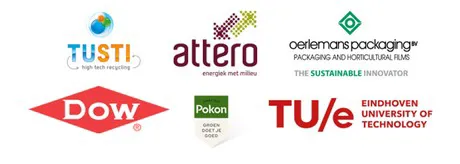No less than 30 to 40 percent of household plastic packaging waste is made up of plastic film. From a technical and organizational point of view, recycling plastic film is very complicated. New film packaging is also almost always manufactured from virgin plastics.
Attero, TUSTI, the Eindhoven University of Technology (TU/e), Dow Benelux, Oerlemans Packaging, and Pokon Naturado have, therefore, joined forces. They have formed a consortium to do technological research into a closed plastic film chain. This closed chain should, eventually, reduce the demand for virgin plastics.

There are challenges in various parts of the value chain. These include guaranteeing a constant waste stream supply and the removal of impurities. The diversity of the new films must be adequately tackled too. This type of recycling must also be made to be economically profitable.
Cooperation between chain partners is essential if these challenges are to be overcome. This study has been given form as the ProLiFeX: “Postconsumer Recycling Of L(L)DPE in Flexible EXtrusion” project. Each organization involved will bring the necessary expertise from their various position in the value chain.
The research has three goals:
1. Developing a competitive, constant, high-quality granulate stream
Attero will shred household PMS plastic film waste. This process will be done in their new Polymer Recycling Plant. The plastic film will be hot and cold washed, and recycled to a granulate.
TUSTI is the knowledge partner when it comes to the quality needed to produce a circular plastic film. They will supply the laboratory test facilities to produce the granulates. They will also test them for the relevant properties.
Attero will make adjustments in its processes to achieve the correct quality.
2. Developing a competitive, recycled-plastic film
There are certain standards that must be met to develop competitive, recycled-plastic film. The film must:
- Be strong enough to, for example, package fertilizers or potting soil.
- Be sealable
- Not cost more per kg of product when it comes to the Waste Management Contribution, without the incentive to use recycled materials
- Not be more expensive to produce
- Not have to be white on the outside
- Stable enough to store the end product for up to one year.
Project partner, Oerlemans Packaging, will produce new plastic films. These will contain Attero’s re-granulates, supplemented by another project partner, Dow's virgin PE. Oerlemans Packaging, Dow, and the TU/e will design specific recipes. These will be for mono-layered as well as multi-layer plastic films.
Dow will perform experimental analyses of the Attero granulates. They will also do these tests on these granulates mixed with other well-chosen materials. These investigations will serve to study the quality, properties, consistency, and variants of this material.
3. Developing circular consumer product packaging with as high a percentage of recycled content as possible
The final project partner is Pokon Naturado. They will test the plastic film produced by Oerlemans Packaging. This testing will be done in a fertilizer packaging plant. The tests will then also be done on multi-layered plastic film packaging for potting soil. Higher demands are made on this type of packaging. These kinds of plastic films must be able to stretch and seal.
Oerlemans Packaging's R&D department will study the film's physical properties, such as printability. This will be done together with Pokon. The TU/e will do additional research. They will disseminate the knowledge gained in this project to the relevant media outlets.
This cooperative project's gained knowledge should enable the consortium partners to identify a packaging with a high percentage of recycled content. This packaging will be suited to large scale production. This type of production is necessary in order to reduce this plastic film packaging's CO2 footprint further.
The ProLiFeX project will run for a period of two and a half years. It is made possible, in part, by a Joint Industry Project subsidy of €495.000.
